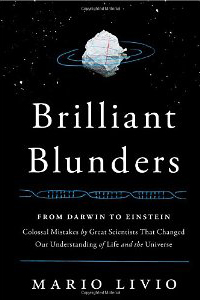Book Notes
 Mario Livio, Brilliant Blunders; From Darwin to Einstein — Colossal Mistakes By Great Scientists That Changed Our Understanding of Life and the Universe (New York: Simon and Schuster, 2013), 341pp.
Mario Livio, Brilliant Blunders; From Darwin to Einstein — Colossal Mistakes By Great Scientists That Changed Our Understanding of Life and the Universe (New York: Simon and Schuster, 2013), 341pp.
After reading Mario Livio's book, the physicist Freeman Dyson of Princeton wrote that he now "looks on the history of science in a new way." Livio looks at only five scientists who made "brilliant blunders" — the naturalist Charles Darwin, physicist William Thomson (Lord Kelvin), the chemist Linus Pauling (two Nobel prizes), and the physicists Fred Hoyle and Albert Einstein. Livio helped Dyson to see many more brilliant blunderers "in ever century and every science."
Darwin's views of blending inheritance and pangenesis were "fundamentally flawed" and "catastrophic" for his view of natural selection. Kelvin was an "obstructionist" who tried to discredit geologists' conclusion that the earth was 4.5 billion years old (and not 100 million years like he argued). Pauling was "preposterously wrong" about the structure of DNA. Hoyle's view of a steady state universe with no beginning or end rejected the consensus view of the Big Bang. Einstein posited a "cosmological constant" to support his idea of a static universe, in opposition to the reality of an expanding cosmos.
Livio corrects the popular notion that science proceeds from one success to another. "Nothing could be further from the truth," he writes. Mistakes and failures are not only inevitable, they are essential as catalysts for progress. In the more conjectural parts of his book, he speculates about the causes of blunders. Science is a human enterprise subject to oversights, memory lapse, haste, competition, personal distractions, opposition to new ideas, cognitive dissonance, bad math, misplaced confidence, misguided intuition, willful blindness to obvious facts, etc.
Dyson concludes his review of Livio with a story about his own biggest blunder. He concurs with Livio's main point, that "the passionate pursuit of wrong theories is part of the normal development of science." Darwin and Einstein were gracious losers who admitted their mistakes. Kelvin and Pauling were "not so good." Hoyle was a bad loser who denied to the end that he had made a mistake. "The greatest scientists," writes Dyson, "are the best losers."
For Dyson's review of Livio's book, see NYRB (March 6, 2014).


